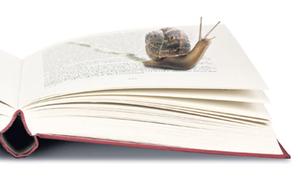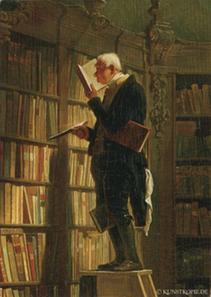Maura Kelly sparked a flurry of online commenting, sharing and retweeting this week with her "Slow-Books Manifesto" piece for the Atlantic. "In our leisure moments, whenever we have down time, we should turn to literature--to works that took some time to write and will take some time to read, but will also stay with us longer than anything else," she wrote. The enthusiastic and "real-time" electronic call and response struck me as deliciously ironic, given her censure of the "Fast" entertainment we are subjected to on "the screens that blare in every corner of America (at the airport, at the gym, in the elevator, in our hands)."
The enthusiastic and "real-time" electronic call and response struck me as deliciously ironic, given her censure of the "Fast" entertainment we are subjected to on "the screens that blare in every corner of America (at the airport, at the gym, in the elevator, in our hands)."
And yet, by nature and temperament, I have always been a slow reader and tend to agree with her manifesto, even if I harbor considerable reservations about the dismissal of "non-literary books" and "emphasis on literature."
Before shattering my readerly innocence by accepting a bookseller's job in the early 1990s, I was a lingerer over pages, paragraphs and sentences of the books I loved. I underlined and committed excessive marginalia. I read passages aloud to people I liked, saying, "Listen to this."
I could have been a poster child for the Slow Book Movement before there was one, though as Malcolm Jones pointed out a couple of years ago, the "phrase 'slow reading' goes back at least as far as the philosopher Friedrich Nietzsche, who in 1887 described himself as a 'teacher of slow reading.' The way he phrased it, you know he thought he was bucking the tide. That makes sense, because the modern world, i.e., a world built upon the concept that fast is good and faster is better, was just getting up a full head of steam."
In Michael Ondaatje's The English Patient, Hana receives this advice: "Read him slowly, dear girl, you must read Kipling slowly. Watch carefully where the commas fall so you can discover the natural pauses. He is a writer who used pen and ink. He looked up from the page a lot, I believe, stared through his window and listened to birds, as most writers who are alone do. Some do not know the names of birds, though he did. Your eye is too quick and North American. Think about the speed of his pen. What an appalling, barnacled old first paragraph it is otherwise."
During my slow reading years, I was habitually monogamous, spending a month with a book, three months with an author's works. Most of those habits became seriously compromised, however, when I entered "the trade" and quickly adopted their bookishly promiscuous ways along with a professional need for reading speed.  For a long time now, I have juggled several books at once--good books and bad books; print books, e-books and audiobooks--while ever casting a covetous gaze toward other tempting titles within reach on shelves and online. There have been far too many one-night-reads, when I scanned 50 pages and bailed.
For a long time now, I have juggled several books at once--good books and bad books; print books, e-books and audiobooks--while ever casting a covetous gaze toward other tempting titles within reach on shelves and online. There have been far too many one-night-reads, when I scanned 50 pages and bailed.
Despite these ongoing betrayals of my slow reading heritage, I've tried to remain faithful to the ancestral tomes as well (currently slow re-reading Our Mutual Friend by Charles Dickens). It may not be enough.
A booklover's life is a complicated affair. As a professional reader--which is what booksellers and editors become--I don't have a vested interest in the titles that land on my desk incessantly, though I begin each with hope and the desire for love. Page one is always virginal.
Books are, in fact, irresistible to me. Always have been. Can I read them all? No. But within the considerable limitations of my ability, time and attention span, I'm reading as fast as I can. Except, of course, when I'm reading... slowly.
As I said, it's complicated. What does that mean?
Not this: "The average person reads between 200 to 400 words per minute. By at least tripling your reading speed you would possess a much wider and more flexible range of reading rates and experience for the first time the thrill of DYNAMIC COMPREHENSION. It is like watching movie."--Evelyn Wood Reading Dynamics
This: Reading is journey. On any trip, sometimes I go fast and sometimes slow. The key lies in not choosing one speed over another permanently (you'll hit a tree), but learning how to shift gears. Yesterday, I was reading and writing at high speed in upstate New York. Today I downshift to Our Mutual Friend and will spend an afternoon in 19th century London. I can even see the road sign coming into view. Caution: Slow Reader Ahead.--Robert Gray, contributing editor (column archives available at Fresh Eyes Now)
top photo: Steve Caplin

